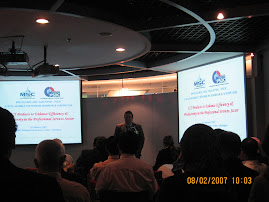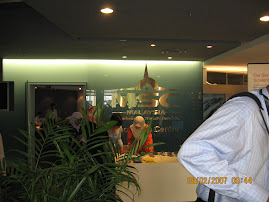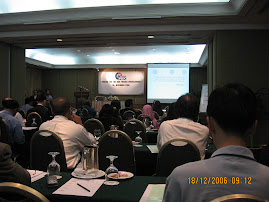(Continuing from Part 5...)
P claims in Para 4 of her Statement of Claim that on or around 16.2.2005, P successfully introduced Y as a prospective buyer of "Hartanah-hartanah tersebut" to D. But in the entire trial, P produced not a single evidence to prove her aforesaid claim. In fact, Y testified that before this trial, he didn't know P nor P's firm.
What P did during trial was to say something which she never pleaded:
1) In A30 of P's W. Statement - P claims that M was the real estate negotiator of P's firm acting under P's direction and D was aware of this. If so, why didn't P plead so in her pleading? Had P pleaded that M was her lawful negotiator and D was aware of it, both P and M would have been cross-examined on this as M did tell D - after M was asked why of all the agency firms, she joined P's firm with a sleeping principal who could not meet up with D - that she joined P's firm because P's firm pay very high commission share (much higher than the 40% allowed by our agency law) and, when asked further, M confided that she did not receive any salary, EPF and Socso contributions from P's firm. During trial, P demonstrated throughout her testimony that she knew practically nothing about what M was doing and what was happening her own firm - even on how M got to contact D, she contradicted M's testimony; how when she first started practisng estate agency, P contradicted the bureaucrat's testimony. P was obviously lying that M worked under P's direction. D asserted in his W. Statement that M was addressed by D as a negotiator in some letters simply because M held herself out to D as a negotiator of P's firm and not because M was in fact a lawful negotiator of P's firm;
2) In A31 of P's W. Statement - P claims that M informs P that Y is her contact. But evidence shows: that Y is also Gary's contact. And,issue of facts is: Was it M or Gary who introduced Y to tender for "Hartanah-hartanah tersebut" through D's firm? Where is the evidence that M introduced Y to D to do so? Didn't Y in fact testify in A4 of Y's W. Statement that "... I never met him (D)...I only knew about D's firm when I was told by M of this Court case". If M had introduced Y to D, would Y be testifying so?
All evidence - Gary's business card, D's phone bills and Gary's facsimile to D, etc. - show that it was Gary who introduced Y to bid for the properties through D's firm; and Gary at no time mentioned that he was doing all these for M, P or P's firm -- a fact confirmed by Gary's facsimile cover note in Pg. 2 of Bundle D which could easily have mentioned M, P or P's firm but it says absolutely nothing about them. Y was obviously bidding for the properties like any busy bidders who ask his close friend (in this case Gary), spouse, runners, etc. to do the preliminary due diligence for him. And, conventionally, it is not uncommon for a real estate agent like D to sell properties to buyers whom they have never met.
However, in all cases of co-agency, the law (Standard 3.2.8, etc.) is very clear: It requires joint-viewing of the properties in which the appointing agent has overall supervision and knowledge of. But Y's testimony in A3 of Y's Witness Statement clearly show that there was no viewing of the properties by Y with D's overall supervision and knowledge. M introduced and showed the properties to Y on her own volition contrary to the law (Standard 3.2.8) - that is, without D's knowledge and overall supervision.
P also fails to produce any evidence to show: that P's firm had purchased the tender packages through D's firm and/or that P's firm had obtained tender submission for the properties from any prospective bidder (including Y) as D firm's co-agent. P fails to do so because there was no such evidence in existence. There was no evidence of any introduction by M, P or P's firm of Y to D that Y tendered for the properties through D's firm! Y appeared to have left it to his close friend Gary to decide to be briefed by which panel agent and Gary chose D's firm. And, it is a fact that this Gary did not work for P's firm at all the material times.
M however testified that she was the one who directed Gary her husband to deal with Y on her behalf. But M did not reveal this to D at any time before the tender closed. Professional estate agency practice and its law also do not allow a non-registered person such as M (or even a registered person, for that matter) to direct anyone who is not in the employment of any registered estate agency firm to act for the agency. If that is allowed, then how is one to tell between bogus agency practice and bona fide agency practice? D's assertion is that if M had indeed directed Gary as claimed, that would be ultra vires and in contravention of our estate agency law.
And, if what Gary did was for M on a one-off basis as her husband, then there would be no need for Gary to give the telephone-cum-fax number of his Mom's florist shop - that would have been absolutely unnecessary. D could have been easily asked by Gary to follow-up the rest with M or M's firm - Gary's involvement was clearly not one-off. It was calculated to deceive D so that M's firm need not pay a single sen for the tender packages because right until the tender closed, Gary did not hold himself out as dealing on behalf of M, P or P's firm or Gary would have been asked to pay fully for the tender packages!
The whole dispute arises simply because there was a cheapskate registered estate agency (P's firm) trying to take advantage of a professional real estate agency (D's firm) by conducting co-agency in such a way that it (P's firm) need not share any costs (of tender packages) and any risks (of service tax); and when the risks and the costs no longer pose any issue, then the cheapskate firm stakes a claim for 50% of the agency fee of the other agency firm. Will the law be on the the side of such an unethical cheapskate estate agency firm which not only practises against the principle of fair-play and justice but also against clear provisions of our law?
Stay tuned for further reporting on the co-agency dispute...











No comments:
Post a Comment